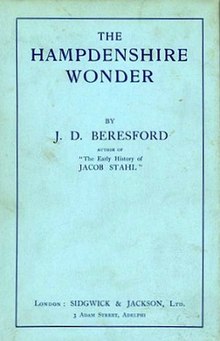This article includes a list of references, related reading, or external links, but its sources remain unclear because it lacks inline citations. (November 2015) |
 First edition | |
| Author | J. D. Beresford |
|---|---|
| Language | English |
| Genre | Science fiction novel |
| Publisher | Sidgwick & Jackson |
Publication date | 1911 |
| Publication place | United Kingdom |
| Media type | Print (hardback & paperback) |
| Pages | 295 pp |
The Hampdenshire Wonder is a science fiction novel by J. D. Beresford, first published 1911. It is one of the first novels to involve a wunderkind (child prodigy). The child, Victor Stott, is the son of a famous cricket player. This origin is perhaps a reference to H. G. Wells's father Joseph Wells, a cricketer. The novel concerns his progress from infant to almost preternaturally clever child. Victor Stott is deformed subtly to allow for his powerful brain. A prominent, and unpleasant, character is the local minister. As Beresford's father was a minister, and Beresford was himself partially disabled, some see autobiographical aspects to the story. However this is unproven.
What is more definite is that the story of Christian Heinrich Heineken (1721–1725) was an inspiration for the story. Whether the biography of that child prodigy was accurate or not, "the Lubeck prodigy" is mentioned in the work. In the original version, the progressionist ideas of Henri Bergson concerning evolution were a significant influence.